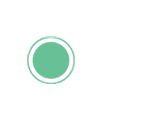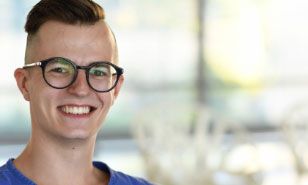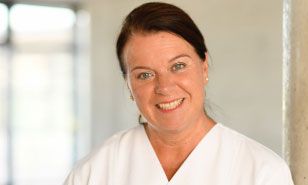
Andreas M.: "I do not see our work as a glorious heroic deed. I have learnt nursing care. - also so that I can act in such very special situations. Nursing has always been more than a job, even before Corona. I am grateful to still be allowed to work and receive a salary while others must fear for their livelihood."
Nursing work in times of COVID-19 – Andreas M. gives some insights on 1 April 2020
Time for a 30-minute break. Andreas, how are you? Are you still able to sleep?
It’s demanding. But I’m fine. We had some very intensive weeks of preparation for a while there. With little leisure time, our private lives are on hold at the moment. I am still able to sleep; I fall into bed exhausted.
You work as a ward manager in emergency admissions. Do you feel well-prepared for this?

Andreas M.: "People often talk about the calm before the storm. We are prepared for a high incidence by the seriously ill - we'll see what comes. It is not clear whether we are currently over- or under-planning. But we are confident that we will master the situation. Capacities and structures have been created in every UKW clinic."
The decisive preparations have now been completed. We in emergency admissions are prepared, even if the COVID load becomes greater in the future. For example, this means that an extension concept for emergency admissions has been set up. Infectious and non-infectious patients are already treated in two areas, separated from each other.
All plans can be activated; this is very reassuring. There is still a great deal to do, however. For example, at present we are obtaining all the new medical equipment. We need two of everything, for instance blood analysis equipment or sonography equipment for both COVID patients and our other acute patients. We are also optimising the cooperation with other points of intersection such as the X-ray department. A mobile X-ray machine has been made available to take X-rays directly in the emergency department and thus avoid unnecessary contacts.

What are your responsibilities with regard to COVID-19?
I am in the “COVID” work group. In an interdisciplinary way, we are here involved in all questions and requirements regarding everything to do with the virus, such as staff planning, room concepts or hygienic measures. We meet once a week; this week is the tenth time. We have thus been dealing with this subject for a long time now. When the virus started to spread in China, we started, too.
In addition to this, I represent the ward management in this field. The most important thing now for us in the leadership team is to signalise approachability. This takes away fear and gives reassurance. We deal with all questions in a careful and sensitive way, for these have a direct influence on the bedside certainty of action. This also means managing the balancing act between desirable and necessary measures, and being able to explain and communicate. We have taken protective precautions: there has long been a general face mask obligation in the emergency department; break regulations to avoid direct social contact, and hand disinfection and hygiene measures carry on as usual.
It is crucial to check one’s own actions exactly and adapt them to the situation. For instance, if a patient needs inhalation, a mask with a higher protective function is necessary; as a nurse you must keep this in mind.
Have there been or are there also obstacles?
We have jumped over large obstacles, but up to now, none of them have been insurmountable. Space and staff concepts had to be thought through and decided on. Alterations initially came thick and fast and for this reason, many changes had to be communicated within a very short time. Everyone, even every part-time staff member, has to be up to date. We have some nurses who only come three times a month. How can everybody obtain the necessary and - above all - the current information? Who can I deploy in which area?
At present, all the structures are being tested. We are constantly questioning whether the actual structure is compatible with the current COVID situation. Routines are thus literally broken up and then, for example, a visiting ban is imposed – or home office is possible for many professions. What is exciting is that fast and pragmatic solutions are created – without a lot of bureaucracy.
What else is exciting?

Andreas M.: "As the management team of the INA/M61, we have grown together even more during the last, very strenuous time of preparation; we spend more time together than with our partners. You could jokingly call it a “work marriage”. There is in fact clear communication at eye level with the best distribution of tasks in close collaboration. When everything is done, there will be a pizza date for two, that's already decided. We‘ve earned it!"
I find the close cooperation with the surgical department quite exciting. We treat all emergency surgical patients who also need care as suspected or confirmed COVID cases. Because nurses from the O17 surgical ward work in our area, we can fall back on their expertise in these cases. Through this, we all gain insights into other specialist fields and gain new competencies. At present, we are making use of this relatively quiet phase for familiarisation and training courses.

Has the way the team cooperates changed?
There was already a great willingness for cooperation even before this and now the feedback is absolutely incredible. Colleagues get in touch and say that we can call them. They are ready to work at short notice, no matter in which shift. People who are off duty or on holiday offer to help out at any time. Such offers are of course very reassuring, as we have to reckon with staff shortages at all times and nevertheless remain capable of acting.
We live in times of great challenge; priorities are changing and in many areas, there is increased solidarity. This closing of ranks can be felt at many points of interaction. This gives me the confidence that we will survive this crisis together, and I have the hope that the positive things will remain and continue to have an effect.
The collaboration is very intensive with our nursing management, who support us in any way they can and are on hand with help and advice if needed. For example, an on-call service was set up in the nursing management. This feeling of knowing I have someone there in the background who can find an answer to problems that are unsolvable for me – that is really great!
A final question: What else would you like to say to our readers?

Andreas M.: "I have been at the University Hospital since 1997. Actually I never wanted to work on such a big house, this "feel-good home feeling" at work has always been important to me, I actually wanted to work on a "small house". I was offered a permanent contract back then, which was the reason for me to start here. First to endocrinology, then to an internal medicine monitoring station. I still remember my early days here very well. I quickly noticed that MED I is a small hospital of its own, where everybody knows everybody. To be part of a big whole and at the same time to have a family feeling, that is MED I and UKW for me. I have been in the emergency department of MED I for 15 years now, and have been the ward manager for a year. To be head of the ward is the most exciting thing I have ever done in my professional life".
We’re not talking here about a common cold and not about flu; I hope everyone has understood that by now. In order to care well for our patients, we need to avoid an increasing infection curve which is too steep and in this way avoid having a great number of seriously ill people who all need looking after at the same time. For each individual this particularly means: limit your contacts! The government’s regulations make real sense and I earnestly ask you to support us and keep to them.

Andreas, thank you very much for your valuable time and the interview!
Here the colleagues on the ward can give you insights into what is involved in their work as a nurse.
You want to work with us? Then we look forward to seeing you!
If you would first like some orientation, then you can gladly come for a couple of days’ observation and form your own opinion. You can contact us by email at pflegedirektion@ukw.de or by phone at the number +49 931 201-57102 so that we can arrange an appointment. We will also be glad to answer any of your questions then.
Your dream job is not advertised at the moment? Then send an unsolicited application for the field you find most attractive and together we will find a place for you. Please send your documents for this in PDF form to: pflegedirektion@ukw.de



